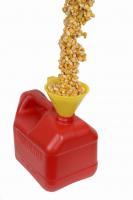Most ethanol produced in Brazil is made from sugar cane and is much cheaper to make than the corn-based variety nurtured by protective tariffs and government subsidies in the U.S. Politicians from corn-producing areas are already crying foul, fearing the plan would undercut American producers by flooding the market with cheap foreign imports.
A news report, however, says by increasing ethanol production and consumption, particularly in countries that produce sugar, the Bush administration hopes to reduce the region’s overall dependence on foreign oil and take some of the pressure off oil prices.
Subscribe to our newsletter
Stay up to date with DeSmog news and alerts






